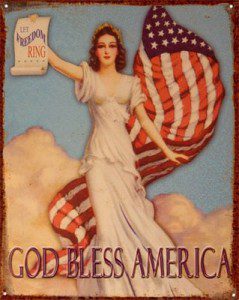 Wilfred McClay recently wrote an excellent cover-page essay for Christianity Today on the civic goods that religion provides to America. Many friends of mine might profess some level of skepticism about so-called “civil religion”; I understand and share some of those concerns. Nonetheless, Christians who encourage the secularization of the public square are falling for a harmful argument. In all kinds of ways, religion is good for public life.
Wilfred McClay recently wrote an excellent cover-page essay for Christianity Today on the civic goods that religion provides to America. Many friends of mine might profess some level of skepticism about so-called “civil religion”; I understand and share some of those concerns. Nonetheless, Christians who encourage the secularization of the public square are falling for a harmful argument. In all kinds of ways, religion is good for public life.
McClay lists five reasons for offering religions “special privileges” in society. He makes a strong case. I would also commend his essays from The City, the journal of Houston Baptist University that I love. Here’s a swatch from his essay:
A fourth argument might be called the “meliorist” argument: Religion deserves an exalted place in American life because of the extensive good works religious institutions reliably perform. Consider the vast scope of charitable, medical, and educational activities still undertaken by religious groups today, not least the Catholic Church. It operates nearly 7,500 primary and secondary schools, enrolling 2.5 million students. It runs 5,600 hospitals (composing nearly 13 percent of American hospitals and 15 percent of hospital beds), 400 health centers, and 1,500 specialized homes. All told, the Church’s institutional network encompasses the largest private educational and health-care systems in the country. Catholic Charities USA is the seventh-largest charity in the nation (the second largest being the Salvation Army).
In addition, a growing body of social-science research correlates religious belief very persuasively with the fostering of generosity, law-abidingness, helpfulness to others, civic engagement, social trust, and many other essential traits. High-profile scholars as diverse as Byron Johnson, Arthur Brooks, Jonathan Haidt, and Robert Putnam have testified to these findings. Of course, there will always be hypocrites, charlatans, fakes, and abusers in religious organizations, as in all walks of life. But it would appear that, far from religion being a poison, as the late Christopher Hitchens liked to argue, it has, at least in America, been an antidote. It seems both inaccurate and counterproductive to disparage or downplay its many benefits.
This is needed testimony. Christians care most about what Jonathan Edwards and others called “true religion,” the circumcision of the heart wrought by faith in the crucified and risen Christ. This is what we’ve banked everything on; this is what we’re giving our lives to promote, whatever line of work God has given us. And yet we also seek to stimulate a rich culture of religious life in our country. This is decidedly a secondary aim. It is not our foremost priority. The extension of the gospel is. But we must not make the good the enemy of the best. I fear that many evangelicals, especially the younger crowd, unwittingly fall prey to this trap.
This is of course a much bigger conversation, one that has many nuances and twists and turns. I am not arguing that Christians should seek to religiously coerce other groups. I am arguing, however, that the public square should be a religion-friendly place, not an anti-religious place. Christians should encourage this. We want to strengthen the freedom to worship according to one’s own convictions. We see that religions provide many goods to society, even if we have ultimate disagreements with those religions.
This is not to say that true religion, gospel faith, can only take root in a society like ours. The gospel can spread anywhere God wants it to, and has. But we are kidding ourselves if we do not realize that a society that has historically prized freedom of religion has aided and abetted the spread of Christianity in all kinds of marvelous ways. Yes, nominalism is a real problem. It is, one could say, a scourge. But this is not the fault of the First Amendment to the U. S. Constitution. Nominalism–faith in name only–is an ageless problem, and it is the responsibility of local churches, not the U. S. government, to guard the gospel through church membership and church discipline.
It is ideal to have a “cultural marketplace” for religion of the kind America has enjoyed for so many years. It is good that religion has had a major place in public life. We should want this to continue, even as we should work as a matter of first priority for the promotion of strong local churches and broader denominations that treasure Christ in a fallen world.
(Image, which I find interesting but do not endorse: Fox News)











